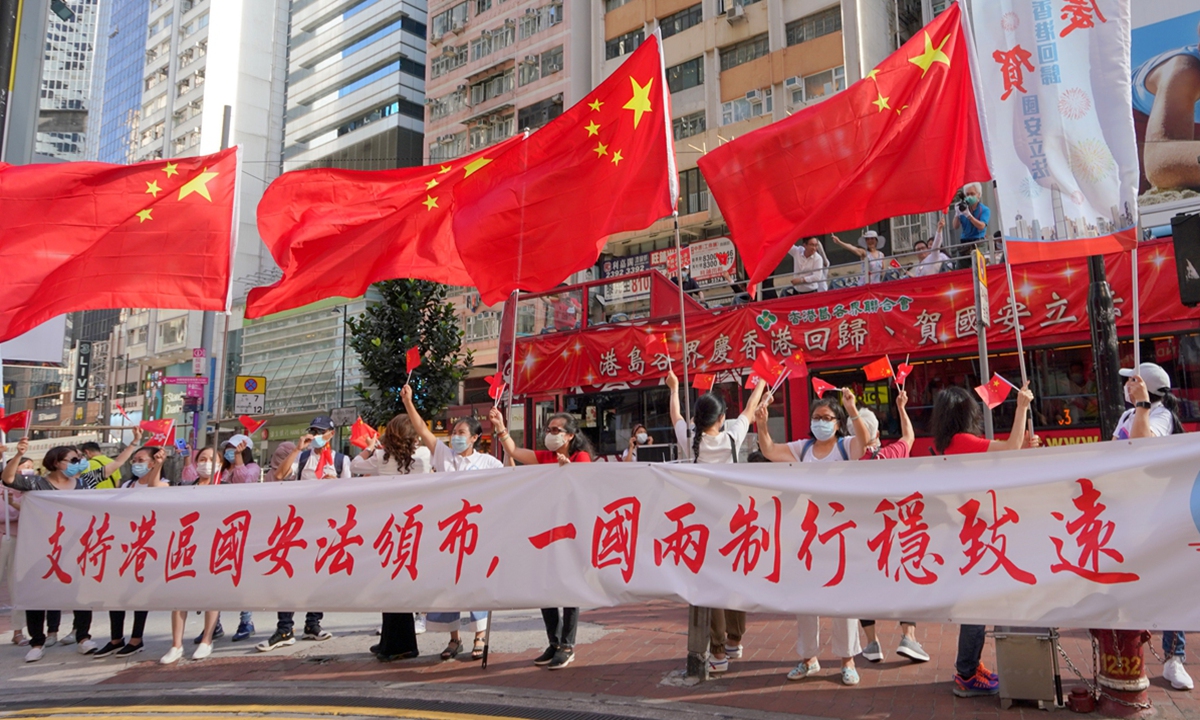HK ‘opposition camp primaries’ ‘a political farce’
By Zhang Hui Source: Global Times Published: 2020/7/13 23:13:40
Lawmakers should perform duties under ‘one country, two systems’

Hong Kong citizens on June 30 gather to support the National Security Law for Hong Kong. Photo: cnsphoto
The "Hong Kong pan-democracy camp" or opposition camp's so-called primary election is a political farce and mobilization for disrupting Legislative Council (LegCo) elections in September, mainland analysts said.
The opposition camp also demonized the national security law for Hong Kong - claiming that the law threatens the "primaries." But experts noted that this was rather far-fetched, as the law neither targets normal political activities in the city nor every politician in the opposition camp.
More than 590,000 voters cast their votes online, and another 20,000 voters did so at polling stations, radical Hong Kong anti-government political activist Tai Yiu-ting claimed on Facebook on Monday. He called the number "record breaking."
However, some analysts believe the number was hyped by the opposition camp, and the camp has tried to fake public support, with the actual number far below the number claimed.
A spokesperson for the central government's liaison office in the HKSAR on Monday condemned the Hong Kong opposition camp for orchestrating illegal "primaries," saying that such political activity is suspected of violating the national security law for Hong Kong and the local election rules.
Hong Kong Chief Executive Carrie Lam said at a press conference on Monday that she will not call the political activities made by the opposition camp "the primaries" because in fact there is no "primary" in the Hong Kong election system.
Hong Kong residents have the right to vote, but the activities "must be fair, open" and the HKSAR government will not tolerate any interruption to the LegCo elections in September, she said.
Lam further said that the government has received numerous complaints that "the primaries" were unfair and violated the government's public gathering ban. Hong Kong authorities will continue to investigate and will respond to any illegal practices in these activities, Hong Kong-based media hk01 reported.
The credibility of the "primaries" was widely questioned as local media reported that voters found that their votes at two different stations both showed success, and the voting station workers did not verify their IDs and addresses, which raised questions of possible duplicate voting, Hong Kong media Oriental Daily reported.
Hong Kong police raided a polling institute on Friday on suspicions that the computers there had been hacked, leading to a leak of personal information. The institute had planned to work with the opposition camp's "primary."
The incident triggered speculation that the opposition camp may hire hackers to serve their "primaries."
Zhi Zhenfeng, a legal expert at the Chinese Academy of Social Sciences in Beijing, said that the online voting is an open voting, which allows all eligible people to vote. If the organizer failed to strictly check the IDs and IP addresses of the voters, then what's the meaning of the vote? In hyping public support, the opposition forces also tried every possible means to connect the "primaries" with the national security law for Hong Kong.
Some foreign media also claimed that the turnout was seen as a test of opposition to the national security law, and a test whether the central government will use the law to interfere in the voting or destroy the "elections."
Analysts said the opposition camp prepared the "primaries" since early this year, which clearly had no relation to the new law.
They used the "primaries" and hyped the national security law to gain themselves some political space and attention, and then tried to turn this attention into ballots in the LegCo elections, but they have to give themselves a proper position. Otherwise, they will be a political joke and marginalized, experts said.
Their aim was to secure at least 35 seats in September's LegCo elections and then coerce or paralyze the Hong Kong government, Tang Fei, a member of the Chinese Association of Hong Kong and Macao Studies, told the Global Times.
Kennedy Wong Ying-ho, a solicitor at the Supreme Court of Hong Kong, said some candidates and people inciting the "primaries" such as Tai have long been known for their connections to the US, and if they colluded with foreign forces in their "elections," the law enforcement department must investigate their "primaries."
It is highly questionable whether the "primaries" were an act of democracy under the framework of "one country, two systems" or a Trojan Horse, Zhi said.
Fan Peng, a research fellow at the Chinese Academy of Social Sciences' Institute of Political Sciences, told the Global Times on Monday that the central government will not undermine the current election rules of Hong Kong or completely eliminate the opposition camp after the national security law for Hong Kong took effect.
Fan said opposition candidates have reached the crossroads where they could perform their duties under the "one country, two systems" or incite riots, hatred and mess up Hong Kong.
If they choose to continue to use the elections for political gain, collude with external forces, incite hatred or even show secessionism in their oath, they would be dealt with by the national security law for Hong Kong, Fan said, noting this has nothing to do with the election itself.
Zhang Xiaoming, a deputy director of the Hong Kong and Macao Affairs Office of the State Council, explained in a press conference on July 1 that speculations claiming the enactment of the national security law is aimed at preventing opposition forces from being elected to the Legislative Council make the legislative purpose of the law too utilitarian and short-sighted, and the law does not treat the whole opposition camp in Hong Kong as an enemy. It targets only a few people, and not the entire opposition, Zhang said.
Posted in: HK/MACAO/TAIWAN